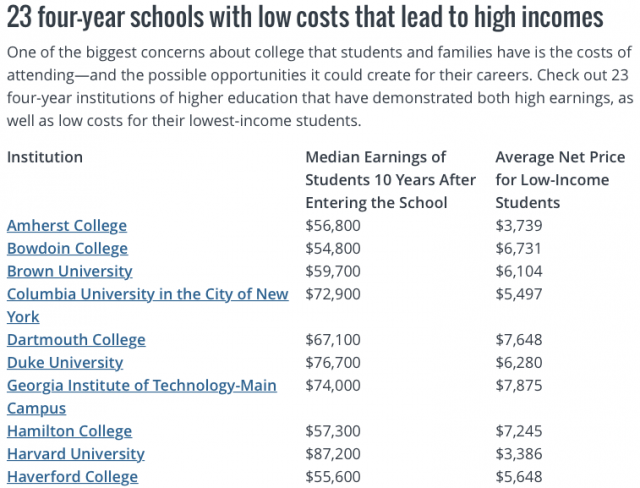College Can’t Be Reduced To How Much Money It Lets You Make

As you may have heard, the government — tired of competing with US News and Unigo.com — decided to put together its own college search engine. Being that all governments like working with numbers, it went a very fact-based route, and the results, as embodied by the new site College Scorecard, are both interesting and informative, albeit in one specific, highly practical way.
If, especially as a low-income high school student, you want to find out whether a certain school is “worth it” in terms of how much tuition you’ll have to put in and how much income you can reasonably expect to get out, this is the site for you.
Here, for example, is a list of the site’s recommendations for high value educations:

Notice that these are overwhelmingly private schools, demonstrating once again that, assuming you can get in, expensive-seeming small, liberal arts colleges and large elite universities can be a better financial bet than state schools because they have more money to throw around. That said, the site does provide a list of affordable state schools with good student outcomes to consider, too.
Naturally I looked up my own alma mater, which is very similar to Haverford College (listed above), only bigger. I was somewhat chagrined, if not surprised, to discover that the median earnings 10 years out for those who received federal financial aid was a relatively paltry $49,400.
Then I remembered a few things:
- I’ve never earned more than $50,000 in one year in my life
- Virtually everyone I know who graduated around the same time I did, about ten years ago, made deliberate, non-lucrative choices: non-profit work, education / academia, organic farming. Even the people who became lawyers went for passion over paychecks: ACLU, AFL-CIO. I’m sitting here trying to think of anyone who’s gotten rich in the decade or so since we crossed that stage, and I’m beginning to feel like that contestant on Final Jeopardy! who scribbled “What Is The Love Ballad of Turd Ferguson” on her screen because she couldn’t come up with a real answer.
- I guess it’s good for kids to know explicitly that Swarthmore is not a great place to go if your plan is to get rich?
- Money isn’t everything. Yes, your ability to earn will matter a great deal when you emerge from college. It will matter all the more under certain circumstances: if your family is depending on you to help out, for example. But small liberal arts colleges will often tell you they teach you how to think — and How to Think and How to Make Money are hardly the same thing. Frankly, I could have used a slightly better education in terms of how to function in the real world, including how not to get laid off from frustrating office jobs. But I cannot fault my How to Think education; I was privileged to be encouraged to pursue it and, in fact, I cannot imagine it could have been better. Despite my spotty early-employment record, I have no regrets.
Kevin Carey makes this point in the Times:
People get a lot more out of college than earnings potential. They learn to be better citizens and better human beings. The world needs dancers and poets along with the future investment bankers and tech entrepreneurs streaming out of elite schools.
The problem is that the dancers and poets are paying the same, ever-rising tuition, even though the necessary cost of running a good poetry program is probably not much more than it was in earlier times when college tuition was much less expensive than it is today. And you can’t pay your student loans back with citizenship — only dollars will do.
Colleges can ameliorate this problem by providing need-based financial aid to low-income students, reducing their debt burden and likelihood of loan default. The new data indicates that some colleges are more successful with this strategy than others.
He also points out that the wage gap persists even among graduates of the top universities. At every school, men make more than women, though the difference is more stark in certain places. Harvard men, for example, make more, on average, than graduates from every other school ($170K); but they also make vastly more than Harvard women ($130K, or about $.65 cents on the dollar).
Don’t feel too bad for Harvard women. On average, they out-earn female graduates from every other school — but their earnings only put them in line with Tufts men. As for Tufts women, no men on the chart make as little as they do.
The real issue, though, remains with certain community colleges and schools where students enroll not primarily to pursue a life of the mind but with more practical objectives. That CUNY graduates tend to earn only a bit more or even, in some cases, less than high school graduates, for example, is startling and useful information.
Note: Carey’s numbers are averages, rather than medians, which I find intriguing, since the info provided on the College Scorecard site is all medians. Plus I can’t find the data behind those gender earnings breakdowns anywhere, though perhaps I’m not looking in the right place. I’ve put in an email to Carey asking for clarification and will let you know what he reports.
Support The Billfold
The Billfold continues to exist thanks to support from our readers. Help us continue to do our work by making a monthly pledge on Patreon or a one-time-only contribution through PayPal.
Comments